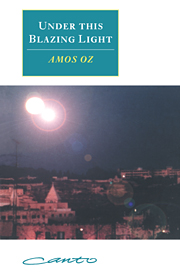Book contents
- Frontmatter
- Contents
- Translator's note
- Preface to the Hebrew edition
- Introduction
- Events and books
- Under this blazing light
- ‘Man is the sum total of all the sin and fire pent up in his bones’
- ‘A ridiculous miracle hanging over our heads’
- The State as reprisal
- A modest attempt to set out a theory
- The meaning of homeland
- The discreet charm of Zionism
- A.D. Gordon today
- Thoughts on the kibbutz
- The kibbutz at the present time
- How to be a socialist
- Munia Mandel's secret language
- Pinchas Lavon
- The lost garden
- An autobiographical note
- An alien city
- Like a gangster on the night of the long knives, but somewhat in a dream
- Notes
- Publication history
- Index of names
Under this blazing light
Published online by Cambridge University Press: 07 September 2010
- Frontmatter
- Contents
- Translator's note
- Preface to the Hebrew edition
- Introduction
- Events and books
- Under this blazing light
- ‘Man is the sum total of all the sin and fire pent up in his bones’
- ‘A ridiculous miracle hanging over our heads’
- The State as reprisal
- A modest attempt to set out a theory
- The meaning of homeland
- The discreet charm of Zionism
- A.D. Gordon today
- Thoughts on the kibbutz
- The kibbutz at the present time
- How to be a socialist
- Munia Mandel's secret language
- Pinchas Lavon
- The lost garden
- An autobiographical note
- An alien city
- Like a gangster on the night of the long knives, but somewhat in a dream
- Notes
- Publication history
- Index of names
Summary
Do not expect me to reveal all sorts of creative secrets, or to work alchemy, or take you on a guided tour of the kitchen, or whatever. On the contrary. My aim here is to express some very simple thoughts about one or two things to do with contemporary Israeli writing.
On the threshold
You've guessed: having said ‘contemporary Israeli’ I am actually going to lead off with totally other places and times. I believe the greatest creations in world literature have almost always been achieved in twilight periods. This is a rather curious phenomenon, that may be out of line with every social or national ideology. All ideologies like to boast that the arts flourish under their aegis. No ideology can be pleased to acknowledge that it is its decline and fall that favours the growth of literature. It is nevertheless true that, in the lives of nations, faiths and cultures, periods of flourishing success, of dynamic creativity, periods when things are getting bigger and stronger, are not propitious to storytellers. (They themselves may well be drawn into such an embrace, but their stories will wend their way to other times and places.) The greatest creations in world literature have generally been produced in the twilight, or in relation to a period of twilight, when a centuries-old civilisation has passed its zenith and is on the decline, whether under external pressure or under its own weight when an ageing culture is beginning to smell of decay.
The authors of some of the best works of world literature are people who have had divided minds in their own time.
- Type
- Chapter
- Information
- Under this Blazing Light , pp. 19 - 36Publisher: Cambridge University PressPrint publication year: 1995



